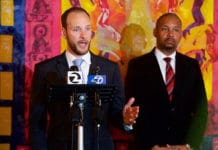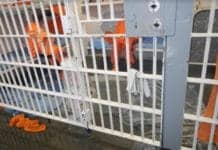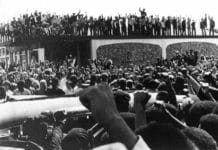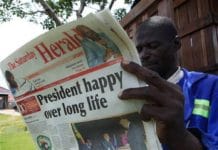by Lettie Justice
 James Bryant, who has been a painful thorn in the side of San Francisco’s African-American community for a very long time, is the subject of a Los Angeles Times investigation over use of his Bayview home, among other issues.
James Bryant, who has been a painful thorn in the side of San Francisco’s African-American community for a very long time, is the subject of a Los Angeles Times investigation over use of his Bayview home, among other issues.
In its March 11 edition, Times staff writer Paul Pringle published an article titled “Finances of charity run by SEIU official scrutinized,” available on-line at http://www.latimes.com/classified/jobs/career/la-me-union11-2009mar11,0,584152.story?page=2.
Pringle reports: “James Bryant, who earned just under $68,000 as a transit station agent in 2007, received about $117,000 that year as president of the San Francisco chapter of the A. Philip Randolph Institute, according to [its] tax return and the city’s Municipal Transportation Agency. He was also paid or reimbursed about $10,000 as an executive board member for SEIU Local 1021, whose political committee he chairs, the union’s financial statements show.”
In February 2009, Pringle won the prestigious 2008 George Polk Award for labor reporting for his news reports about corruption in the nation’s fastest-growing labor union, Service Employees International Union. Pringle’s series disclosed payments of hundreds of thousands of dollars in union funds used to benefit Tyrone Freeman and his family. Freeman headed a Los Angeles local of SEIU until he was forced out of office by the SEIU International; Freeman remains the subject of a federal criminal investigation.
Pringle now reports that the tax-exempt nonprofit status of the A. Philip Randolph Institute’s San Francisco chapter “is to promote civil rights, voter education and the interests of black workers. Its biggest contributors include Pacific Gas & Electric and other corporate benefactors that have enlisted it to campaign for or against ballot initiatives dealing with energy and land development.”
One of those corporate benefactors is Lennar, described in the San Francisco Bay Guardian’s major expose as “the corporation that ate San Francisco.” Pringle writes: “A campaign financed by Lennar Homes also paid the institute tens of thousands of dollars last year for work promoting a redevelopment measure [Proposition G on the June 3 ballot to give Lennar development rights to hundreds of acres in Hunters Point that overcame a large lead by the community’s competing initiative, Proposition F, after Lennar poured $5 million into its campaign], said Alex Tourk, a spokesman for Lennar. Tourk said the nonprofit did voter outreach in the area where affordable housing would be built.
“Experts say a charity should only act as an advocate for corporate donors if such activities coincide with the nonprofit’s tax-exempt purpose.”
Until recently, APRI-San Francisco’s web site indicated on its “About” page in its “President’s Message” that “The APRI San Francisco chapter now is not only involved with voter registration and education but has now become a community outreach group for private organizations like PG&E.” In his March 11 article, Pringle quoted the American Institute of Philanthropy’s president, Daniel Borochoff, who said the charity should not act as “a surrogate” for PG&E while getting a taxpayer subsidy.
“‘Why is this being done through a nonprofit entity?’ [Borochoff] said of the charity’s efforts against the city utility proposals. ‘It seems the corporation [PG&E] should be doing this on its own.'”
In the four days following Pringle’s March 11 Los Angeles Times article, the President’s Message page on APRI-SF’s web site has suddenly been edited. The only thing remaining on that page as of March 15 is a mug shot of Mr. Bryant without any text, suggesting that his previous message indicating APRI-SF had expanded its mission to be a “community outreach partner” for PG&E and other corporations may have suddenly become a public relations embarrassment for PG&E and the national headquarters of APRI.
Nonprofit watchdogs, including www.CharityNavigator.com, have concerns that APRI-SF may be straying from the mission it claimed when it first sought tax-exempt status from the IRS.
Pringle’s article on potential union self-dealing details the $117,000 salary APRI-SF paid to James Bryant, the $62,000 salary paid to Bryant’s son Joseph, and rent payments for a house at 128 Bay View Circle owned, according to the San Francisco Assessor-Recorder’s office, by Bryant and his wife Josefina, whose nickname is “Josie.” Josie Bryant is an employee of SEIU Local 1021.
APRI’s former executive director, Guillermo Rodriguez, who worked in PG&E’s public relations department before becoming APRI-SF’s executive director, declined to be interviewed for Pringle’s article. Rodriguez was lured away from APRI by Mayor Gavin Newsom in March 2008 to head San Francisco’s CityBuild program.
Perhaps not so coincidentally, later in March 2008 the Sun-Reporter newspaper featured APRI-SF’s annual fundraising gala, including extensive photographs of James Bryant with honorees Clayola Brown and Tyrone Freeman, various PG&E officials, SEIU Local 1021’s appointed president Damita Davis Howard, and several prominent San Francisco politicians, including Willie L. Brown, Mark Leno, Kamala Harris and Aaron Peskin.
Clayola Brown, president of APRI’s national organization, also declined to be interviewed by Pringle, as did James Bryant.
Pringle reports that although an SEIU spokesperson said the union is reviewing an internal complaint brought by a union member, SEIU is declining to discuss specifics. In addition to that complaint filed internally within Local 1021, which has dragged on since May 2008, another complaint is reported to have been filed with SEIU International president Andy Stern two and a half months ago.
 Neither complaint has been resolved to date, despite the SEIU International’s assertion that tougher conflict-of-interest rules would be developed and adopted “within 90 days” following the August 2008 scandal involving Tyrone Freeman of SEIU’s Los Angeles local. Nearly nine months later, Local 1021 still has not adopted stronger accountability rules in the wake of the Freeman scandal.
Neither complaint has been resolved to date, despite the SEIU International’s assertion that tougher conflict-of-interest rules would be developed and adopted “within 90 days” following the August 2008 scandal involving Tyrone Freeman of SEIU’s Los Angeles local. Nearly nine months later, Local 1021 still has not adopted stronger accountability rules in the wake of the Freeman scandal.
Andy Stern and his appointee, Damita Davis Howard, appear to be in no hurry to investigate charges of Bryant’s potential self-dealing. Both of them have reportedly known about Bryant’s financial activities for nearly three years. Yet Bryant is still serving as the chairperson of Local 1021’s political action committee and also as president of APRI-San Francisco.
 Bryant’s activities must have A. Philip Randolph reeling in his grave. Randolph, founder of the Brotherhood of Sleeping Car Porters and the main organizer of the 1963 March on Washington for Jobs and Freedom, remembered primarily for Dr. Martin Luther King’s “I have a dream” speech, profoundly changed the course and raised the image of both the labor and civil rights movements in this country.
Bryant’s activities must have A. Philip Randolph reeling in his grave. Randolph, founder of the Brotherhood of Sleeping Car Porters and the main organizer of the 1963 March on Washington for Jobs and Freedom, remembered primarily for Dr. Martin Luther King’s “I have a dream” speech, profoundly changed the course and raised the image of both the labor and civil rights movements in this country.
What Bryant and APRI-SF do to suppress the vote during every election in San Francisco is one of the Black community’s chief complaints. For starters, Bryant needs to stop disparaging the good name of respected Black trade unionist A. Philip Randolph. Even if the SEIU International – including Stern and Davis Howard – takes no disciplinary action against Bryant, the national headquarters of APRI must do so in order to avoid the perception that internal union corruption in the name of A. Philip Randolph will be tolerated by San Francisco’s African-American community.
San Francisco writer Lettie Justice can be reached at lettiejustice@yahoo.com. Bay View staff contribute to this story.

 Store
Store












